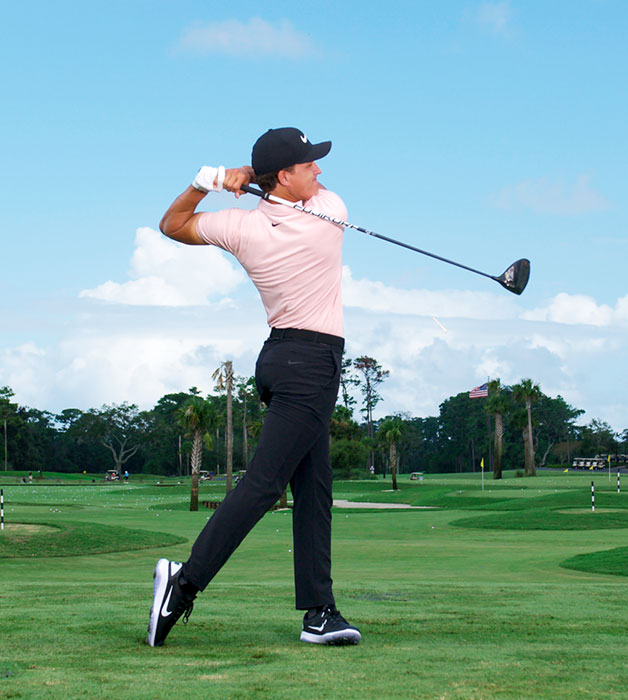Sean Foley remembers the first time he saw Cameron Champ swing a club. It was at Foley’s academy in Florida, and Cameron was about 14. Foley was working with many tour pros at that time, including Justin Rose and Hunter Mahan, but what he saw that day prompted him to call his wife, Kate, and tell her to clear his teaching schedule the next day.
“I can’t say in print what my reaction was, but wow!” Foley says. “We spent the whole next day working on his game. And when you look at him now, he’s got the accuracy of David Toms off the tee but hits it 30 yards past Dustin Johnson.”
That’s not hyperbole. Even the longest of players in professional golf recognise that Champ – great name, by the way – is hitting drives that defy logic. He’s 23, a hair shorter than 6 feet and weighs about 80 kilogramså And that’s a bulked-up 80, Champ says. On the Web.com Tour in 2018, Champ averaged – are you ready for this? – 313.7 metres (343.1 yards) off the tee. At the 2017 US Open at Erin Hills, where Champ first got the golf world’s attention, he led the field with a 308-metre average. His accuracy is pretty impressive, too. He was third on the Web.com Tour last season in total driving, a stat that combines distance and accuracy prowess, and fourth in greens in regulation (75.5 percent).
Now, less than a year after turning pro and winning the Web.com’s Utah Championship, he’s earned a US PGA Tour card and already won – capturing the Sanderson Farms event.
“When he swings, he applies so much force to the grip of his club, he’s capable of snapping a graphite shaft in the middle,” says Foley, who’s still Champ’s coach. “Any idea how hard it is to do that? That’s Bruce Lee stuff right there.”
As violently as Champ swings a driver, his personality suggests a gentler approach to golf. He’s friendly, thoughtful and reserved, Foley says. He keeps mostly to himself on tour, although he says he’ll probably be sharing hotel rooms this season with fellow rookie Sam Burns. Off the course, you’ll likely find Champ doing something related to his interest in motor vehicles, particularly working on his tricked-out Chevy diesel ute that has more than 700 horsepower.
“It’s my thing when I want to get away from golf,” he says.
Australian Golf Digest recently visited with Champ to get a closer look at his impressive drives, talk to him and Foley about how he became the longest player on the pro tours, and capture his blazingly fast swing for your viewing pleasure. His stock drive is a missile, launching at only 4 or 5 degrees (most bombers launch it at 11 degrees or more) yet staying in the air nearly 270 metres before it lands and rolls another 35 or 40. You have to see it to believe it, but you’d better duck.
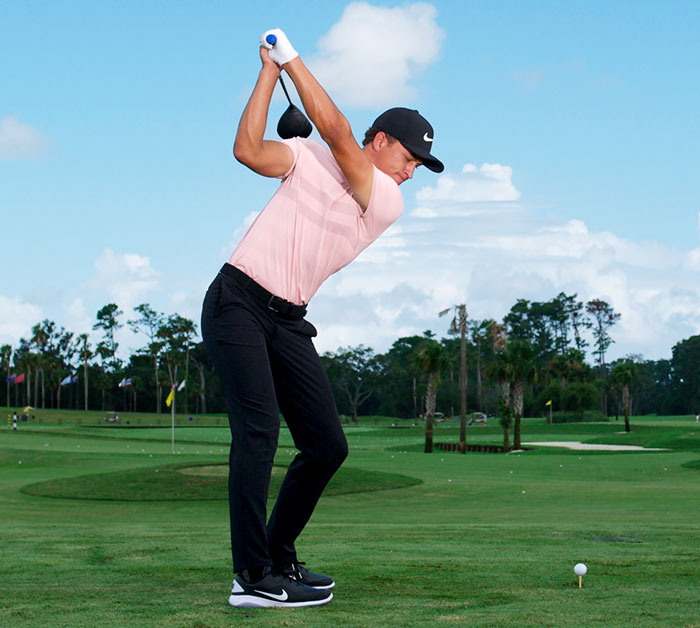 1. Moving Slowly To The Top
1. Moving Slowly To The Top
Champ has one go-to swing thought when he’s not driving it like he should: take the club back slowly, he says. “If I rush to get back, my timing will be off.” Foley says there are two things to note about Champ’s backswing [left]. “Look at his right leg. He’s really loaded into it without swaying off the ball,” Foley says. “That’s a good thing for anyone to copy.” Also, the shaft of his club is across the line (pointing right of his target) because of the length of his backswing. “I should add that although he’s getting ready to unload a lot of force in the downswing, there’s no tension in his body at this point,” Foley says. “That’s another thing you need for your swing.”
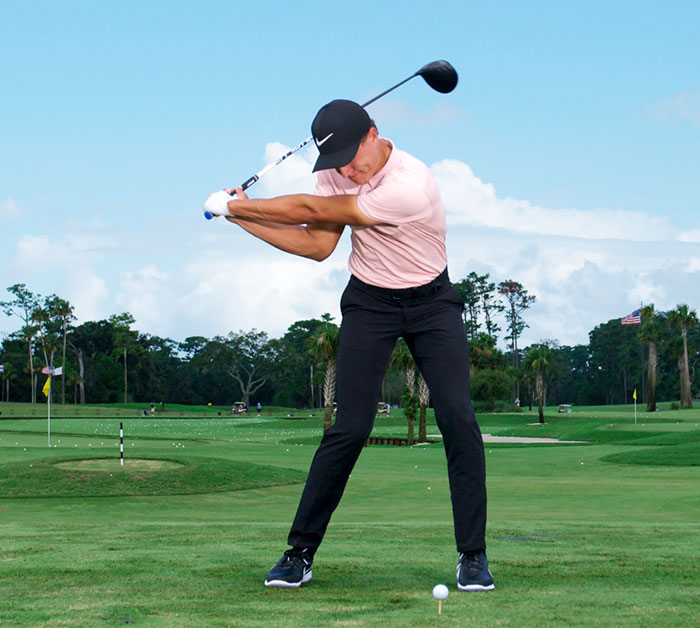 2. Drawing Back The Sling
2. Drawing Back The Sling
Champ’s downswing begins with a quick rotation of the hips. “We talk about getting my belt buckle facing the target as fast as I can,” Champ says. Letting the lower body lead allows him to hold off the release of the club much later – what Champ refers to as his “slingshot” move. Foley says the thing to note is how much the clubhead lags behind Champ’s hands [left]. It’s not from pulling the handle down – a common amateur mistake. In fact, his arms are doing very little at this point. His club is simply dropping as a result of his lower-body rotation. “If you can feel that when you swing, you’ll be surprised how much better your drives will be,” Foley says.
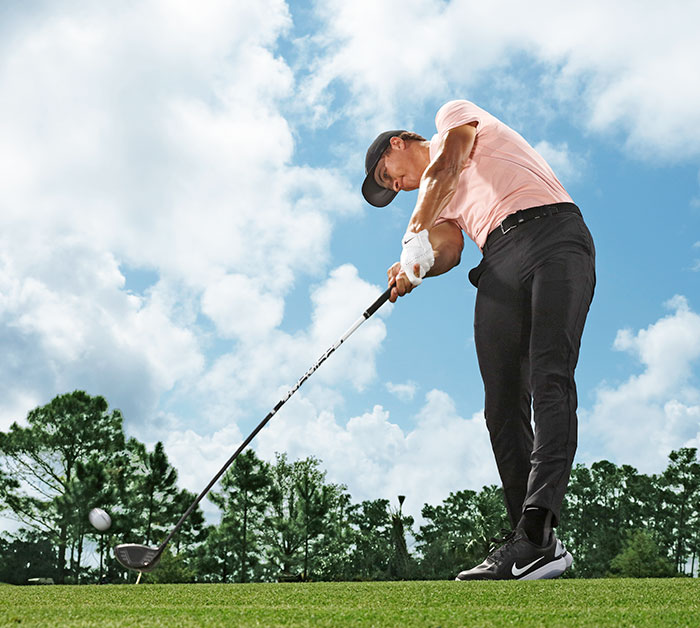 3. Releasing The Rock
3. Releasing The Rock
Champ’s game has been refined since he was 14, Foley says, but the through-swing still looks the same. “It doesn’t look like he’s going at it super hard, because it’s very difficult to see the force and torque he applies,” Foley says. “There’s hardly any side-to-side movement in his swing, but he’s shifting his pressure from right to left big-time.” The takeaway: if you can improve your interaction with the ground in the downswing, it’s going to result in more power without feeling like you’re swinging any harder, Foley says. “I feel like I’m pushing into the ground really hard, and that lets me build speed and snap the clubhead at the ball,” Champ says. “That’s why I say it’s a slingshot.”
“We talk about getting my belt buckle facing the target
as fast as I can” – Cameron Champ
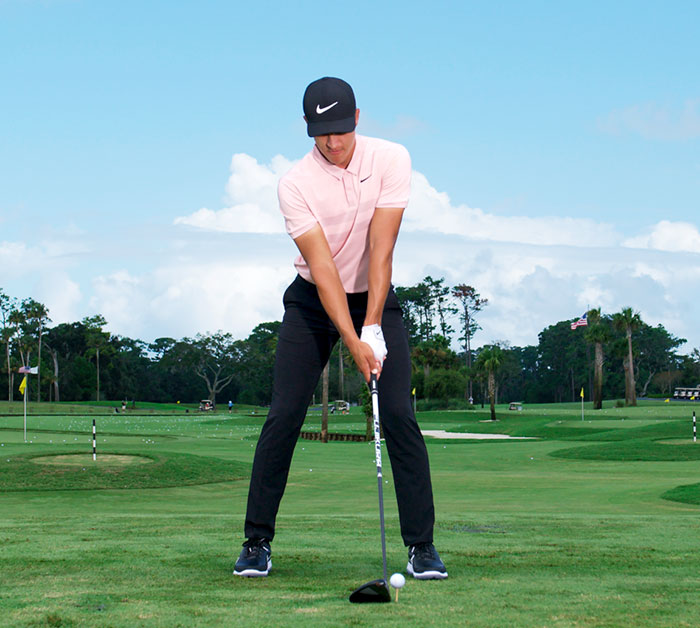
Fader’s mentality
Champ’s ideal ball flight with the driver is a very small fade, “not even five yards,” he says. He can easily adjust trajectory, but says missing left is not an issue. Foley says Champ has a tendency to aim too far right and then rake across the ball. He wants him feeling like he’s addressing the ball standing slightly open, even if he’s really not.
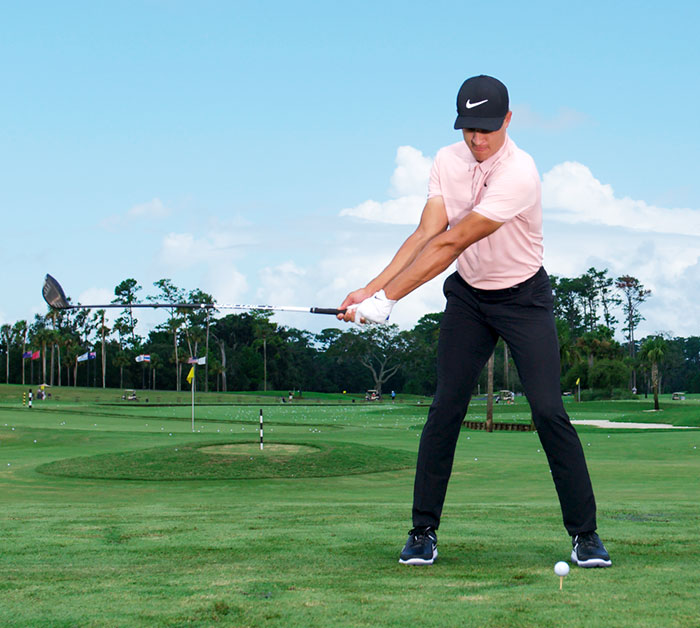
Watch the hands
An unhurried takeaway is super important for sequencing the downswing properly, Champ says. Also important as he starts the swing is keeping the hand path inside the target line, Foley says. The goal is to avoid a short, quick backswing where he hoists the club upwards. That gets him jammed on the downswing, forcing an off-line shot.
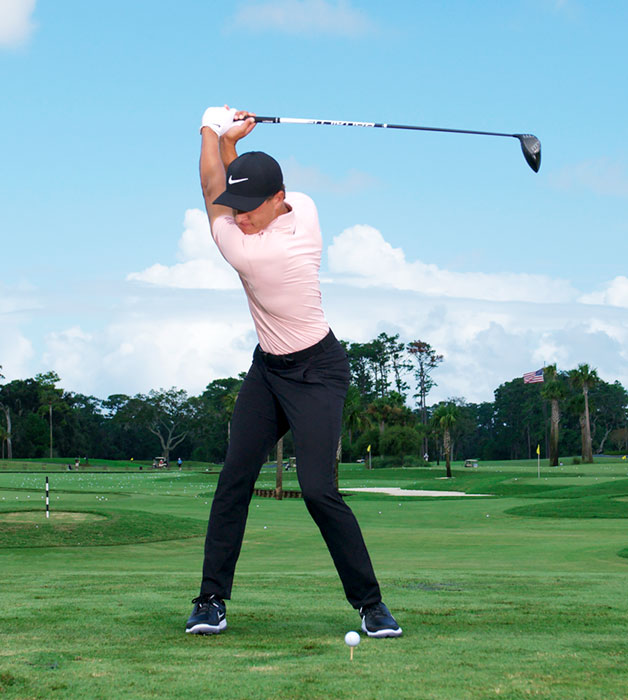
Getting off plane
Teachers often talk about the importance of being on-plane as you reach the top, with the shaft pointing parallel left of the target. This sets up a better downswing. But if Champ didn’t have the shaft across the target line at the top, he’d hit a lot of pulls, Foley says. “He needs it there to avoid getting the club in front of him too quickly in the downswing.”
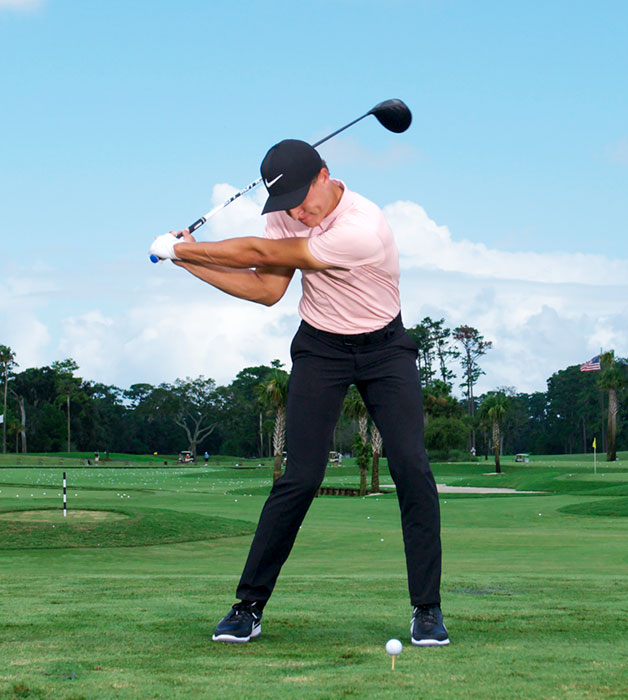
Lagging like Sergio and Trevino
“Look at how much his club lies down from the top,” Foley says. “The drop is as much as Sergio’s or Lee Trevino’s, only Cam’s doing it faster.” The goal is to quiet upper-body action at the start of the downswing. “He’ll sometimes start down with his torso,” Foley says. “When that happens, he can’t release the club, and he wipes it. So that’s something we work on.”
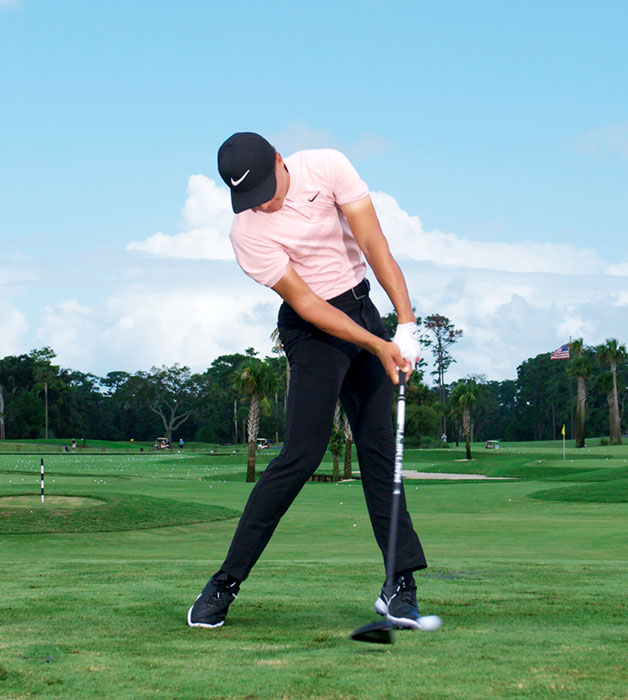
Wicked Twist
Midway through the downswing, Champ gets his swing speed up to 130mph with a tremendous amount of twisting and pulling action – torque – on the handle. Not shockingly, what Cameron is doing to the grip and the ground is very similar to what long-drive champ Jamie Sadlowski does. “It’s not a push off the ground,” Foley says. “It’s a jump.”
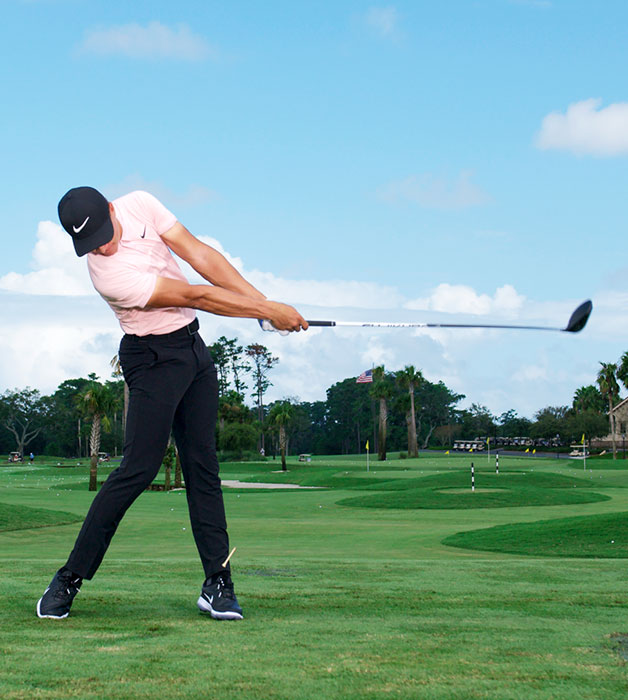
Snap Dragon
The club snaps through the impact zone blindingly fast, but note the position of his left wrist – it’s slightly bowed, indicating he’s not hyperactive with his hands and wrists. His speed comes more from the body, Foley says. “I also want to see his right ear more downward, showing that he’s using his eyes to help with rotation and to protect the neck and spine.”

